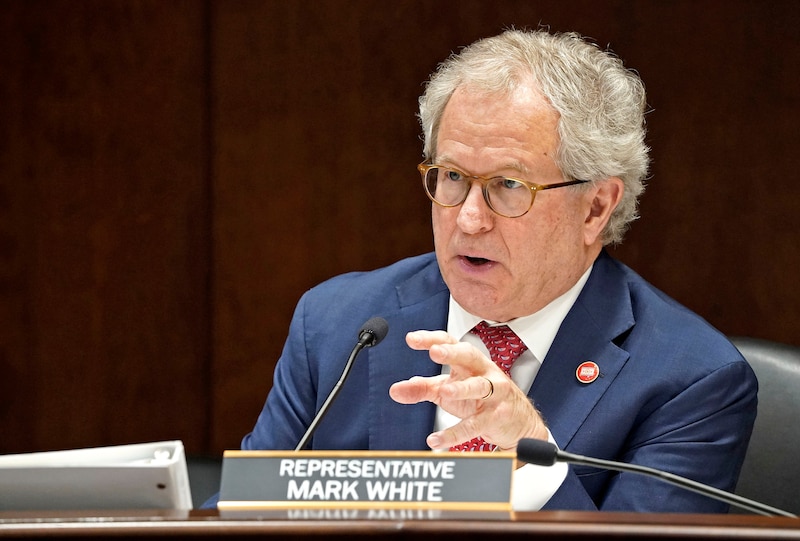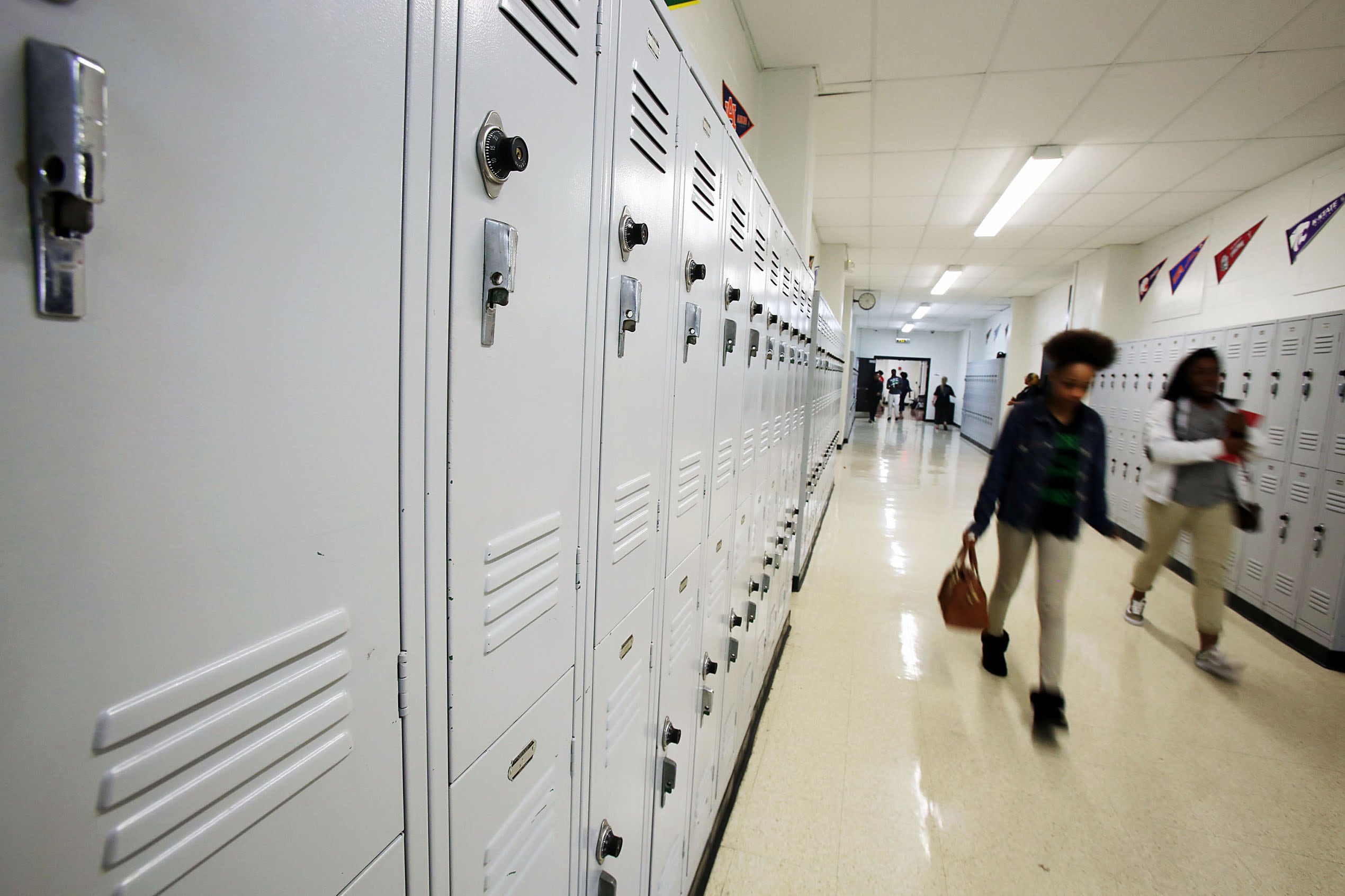Sign up for Chalkbeat Tennessee’s free newsletter to keep up with statewide education policy and Memphis-Shelby County Schools.
A Tennessee lawmaker wants Memphis-Shelby County Schools to come under the oversight of a state-appointed management board to address concerns about the district’s leadership, facilities, curriculum, and finances.
Rep. Mark White told Chalkbeat he intends to introduce legislation that would create a seven- to nine-member board, filled by Memphis-area residents who have expertise on those topics, that would oversee the local elected school board until the state deems the district has stabilized.
The Memphis Republican, who also chairs the House Education Committee, said he’s working on legislation modeled after a Texas law that allowed that state to take over Houston’s nearly 200,000-student public school system, the nation’s eighth largest district, in 2023. The Texas Education Agency replaced Superintendent Millard House II, a former district administrator in Clarksville, Tennessee, with a new leader and an appointed board of managers comprising local residents.

But White said that, under his bill, the elected board for Memphis-Shelby County Schools would remain in place, “because they have a lot of duties to carry out, and there are a thousand moving parts to running a school system this large.”
He added, however, that the board would have to work under the management board’s supervision until state officials believe the district has stabilized.
“We’ve got to do something,” White said, “and we think this model will work.”
A spokesperson for Memphis-Shelby County Schools said Friday that the district had no comment about White’s draft legislation.
Earlier this week, MSCS board member Michelle McKissack told Chalkbeat that while she doesn’t want a state takeover, she also understands why some community members would be open to it. McKissack was one of the strongest defenders of former Superintendent Marie Feagins and sought to block her ouster.
“It’s always best for a school district to be left in the hands of the people who are locally in the district, who are right there with the folks,” McKissack said. “You always want to have local control when you’re talking about education.”
“But at the same time,” she said, “our local school board is not listening to the people who elected them. … I see where it’s coming from to a certain extent.”
Talk of a state takeover of Memphis-Shelby County Schools has swirled for weeks, even before the school board fired Feagins on Jan. 21 after a nine-month tenure marked by tense relations with some school board members.
Feagins enjoyed widespread support from within the district and community for shaking up the bureaucracy and aggressively shrinking central office staff, transferring many of the workers to understaffed schools.
The board fired her anyway, despite pleas from White, the Shelby County Commission, a couple of board members, and community leaders to hold off and try to work through their differences in order to avoid another prolonged search for a new superintendent.
On Monday, House Speaker Cameron Sexton told Memphis radio station KWAM that the state will take over the school system because of the leadership turnover. He called Feagins a “great leader” and pledged that the state will establish a different board “to get the schools back under control.”
Lt. Gov. Randy McNally agreed that the status quo is unacceptable.
“If the board cannot get its act together, and it is becoming very clear they can’t, the state will have to step in,” McNally told Chalkbeat in a statement.
State oversight or state overreach?
Democratic state lawmakers representing Memphis characterize any change in school board governance as “state overreach,” especially in a community where power, politics, and race have long loomed large in the relationship between the state and the public school district.
Sen. Raumesh Akbari said gutting the authority of a locally elected board would be an “attack on democracy,” while Sen. London Lamar said it would set a troubling precedent. Both called it a step backwards.
“Memphis-Shelby County Schools are making progress, despite being part of one of the most underfunded state education systems in the country,” Akbari said.
Last year, for the third straight year, the district earned the highest possible score for academic growth under the state’s accountability system, exceeding state expectations.
State Rep. G.A. Hardaway, who also represents Memphis, said the takeover talk reminds him of when the state took over dozens of Memphis schools for placement in the state-run Achievement School District beginning in 2012. The school turnaround initiative, which is likely to be shuttered by lawmakers this year, has been wildly unpopular and mostly unsuccessful in improving academic performance in low-performing schools.
“We failed children miserably with the ASD, and now we have the nerve to say we’re going to create ASD on steroids by taking a chainsaw to Memphis-Shelby County Schools? That doesn’t make sense,” Hardaway said.
White, while acknowledging the failures of the turnaround district, calls that comparison “apples and oranges.”
“That was more of an academic intervention that involved schools, classrooms, and teachers. This would be a management intervention,” he said.
White said he has met in the last week with Shelby County Mayor Lee Harris, interim Memphis school Superintendent Roderick Richmond, and school board member Sable Otey, among others, to talk about community backlash over Feagins’ firing, and what should happen next. Earlier this month, the Shelby County Commission passed a resolution declaring no confidence in the school board.
White said that in drafting the bill, he’s conferred with Sexton’s staff and Sen. Brent Taylor, the Memphis Republican who will be the measure’s co-sponsor.
State takeover of Houston district is steeped in controversy
The Texas Education Agency appointed a nine-member board of managers and installed a new superintendent to oversee the Houston district beginning in 2023, reducing the elected board to an advisory body. The plan is to return the district to local control once the district meets established criteria.
The changes in Houston have been sweeping, and often divisive. According to The Houston Landing, the new state-appointed leadership redesigned teaching and learning, sought to tie teacher pay more closely to student test scores, boosted some teacher salaries by tens of thousands of dollars, and slashed spending on many non-classroom expenses.
While state test scores improved in 2024, critics of the takeover have pointed to high teacher turnover and question the long-term affordability of the turnaround plan, the Landing reported.
Others called the takeover the latest example of Republican and predominantly white state officials asserting power in heavily minority and Democratic-led cities.
Some Houston officials have called for an end to the takeover and an investigation into why and how it happened.
Tennessee lawmakers will be moving on to other business now that they’ve completed a special session that was headlined by passage of a universal school voucher bill. White said that his draft legislation would likely call for the change in Memphis governance to happen July 1, though it could be sooner.
“Some are calling this a takeover,” he said, “but I call it an intervention.”
Marta Aldrich is a senior correspondent and covers the statehouse for Chalkbeat Tennessee. Contact her at maldrich@chalkbeat.org.
Memphis-based reporter Dima Amro contributed to this story.







